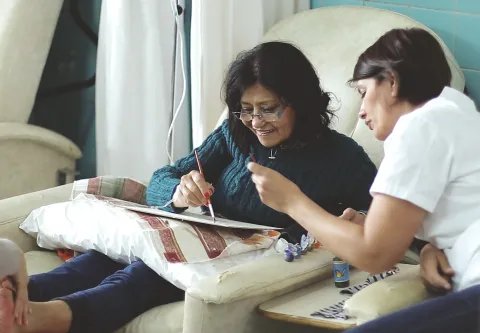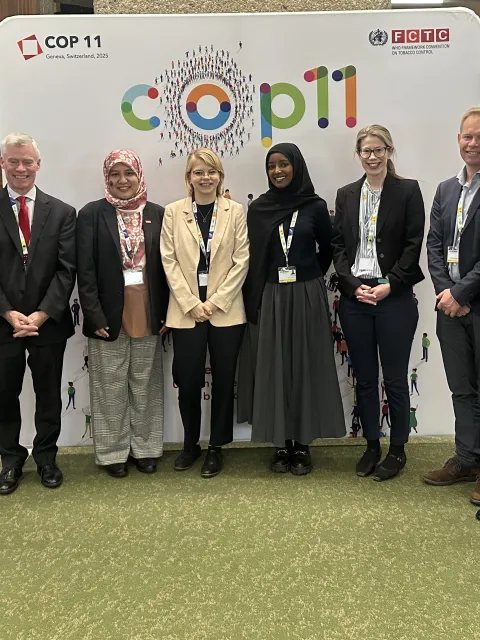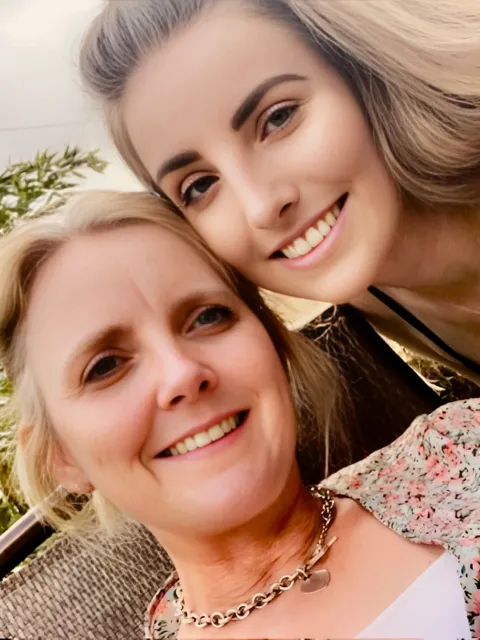How the voices of people living with cancer can drive systemic reform in cancer care delivery
A new paper by Fundación Donde Quiero Estar, a UICC member, outlines key barriers in Argentina’s cancer care system, using the experiences of people living with cancer to guide future reforms toward more people-centred and coordinated care. Interview with Maria de San Martin, the Executive Director of the Foundation.

HIGHLIGHTS
-
Fundación Donde Quiero Estar, a UICC member organisation that integrates emotional support and creative therapies in over 20 public hospitals, has just published a paper highlighting major barriers to cancer care in Argentina, and recommendations to address them
-
Key systemic barriers include delays, fragmented services, and poor coordination. The paper recommends solutions such as a national cancer control plan, improved data collection, and system digitisation.
-
A comprehensive national report is in development, aiming to offer region-specific recommendations backed by patient data and expert input.
-
A nationwide network of over 150 cancer organisations and a regional collaboration across Latin America are driving broader health system improvements.
Delivering quality cancer care is not only about access to screening, diagnosis, and treatment, and the latest therapies – it’s about how care is delivered, how patients are supported through the system, and whether those systems are designed to treat the whole person.
Yet, many patients in many countries face fragmented services, long delays, and emotional isolation, compounding an already difficult journey. Argentina is no exception, and the Fundación Donde Quiero Estar, a UICC member organisiation, is working on several fronts to address these challenges, from grassroots projects such as offering art and reflexology in chemotherapy rooms, to joining in national conversations about cancer care reform.
The organisation was founded after Santiago, the brother of Maria de San Martin, the Executive Director of the Foundation, passed away in 2006 from a brain tumour at age 17. Maria’s mother, Vicky Viel, developed a programme at the José De San Martín Clinical Hospital to support patients with breast and uterine cancer through localised gymnastics, photography sessions, and reflexology. She asked María to join her, and she introduced painting workshops during chemotherapy, which proved highly successful.
The Foundation has now published a paper mapping out key barriers to care in Argentina, drawn from the experiences of the people living with cancer that they work with. Maria de San Martin spoke with UICC about the paper, and the organisation’s strong belief in the value of listening – to patients, to professionals, and to the data – in order to transform systems into adopting a more people-centred approach to service delivery.
A more in-depth report, set to be released in the coming months, will analyse systemic weaknesses and recommend concrete actions, why systems must transform to truly serve people with cancer.
What are the key findings and objectives of the paper recently published by the Fundación Donde Quiero Estar?
With this paper, we wanted to take everything we’d seen and experienced over the years and put it into a structured framework. The intention was to look at how people with cancer move through Argentina’s healthcare system – and where that system fails them. The article identifies common barriers patients face, such as delayed diagnoses, administrative obstacles, lack of coordination between care providers, and geographical disparities – and offer actionable solutions.
The main objective was to offer a clear framework – based on the experiences of people living with cancer – that we can use to structure further research and drive change. It’s the first step toward a more comprehensive national report that we’re developing, and hope to publish in the next two months, to cross-analyse variables, prioritise barriers by region, and offer specific recommendations for systemic reform based on data.
What are some of the key issues the article highlights?
One of the most serious is fragmentation. People have to navigate multiple layers to receive care: national and provincial systems, different insurance schemes, and disconnected institutions. Then there are bureaucratic delays: paperwork that should take days, instead takes weeks or months. People often don’t even know where to go or what their rights are.
And late diagnosis is a huge problem. It's not just a health issue – it’s an economic one. Treating advanced-stage cancer costs more and leads to worse outcomes. If we could improve early diagnosis, the whole system would benefit.
How will the upcoming report build on this article?
The report will be based on a large set of patient experiences and quantitative data from our access programme and national network. It will dig deeper into the barriers we identified – geographical, bureaucratic, informational, emotional – and propose actionable solutions. We’re also building a working group of experts to help prioritise and shape these recommendations, province by province. This isn’t just about pointing out problems – it’s about helping fix them.
What kind of systemic changes do you think are most urgently needed?
There are three that stand out. First, we need a national cancer control plan. Right now, there isn’t one. Without it, you can’t coordinate services or set clear goals.
Second, we need proper data. The government currently collects cancer data from just 44 hospitals. That’s not enough to make informed decisions. You can’t manage what you don’t measure.
And third – we need to digitise the system. Patient records, treatment approvals, referrals – all of it should be digital and connected. It’s 2025. Patients shouldn’t be running around with printed forms.
Your Foundation also runs several patient support programmes. How do these relate to your advocacy work?
The programme that we developped with my mother at the José De San Martín Clinical Hospital after my brother passed away was replicated in over 20 public hospitals. In 2019, we launched the website mundocancer.org was launched to centralise cancer information and provide personalised support. Following the pandemic, an emotional support programme was established to help patients and their families.
Everything is connected. Our art and reflexology programme helps improve patient wellbeing during chemotherapy. Our access programme helps people navigate the health system. Our emotional support programme pairs patients with psychologists to help them manage anxiety and depression. And through mundocáncer, we centralise all the information patients need.
All of this gives us a unique view into the real-life challenges people face. We work with patients every day. That’s what feeds our advocacy.
Could you tell us more about your network of organisations across Argentina?
Together with Asociación Civil Sostén, we created a national network of over 150 cancer organisations during the COVID-19 pandemic. Since then, it’s become a key platform for sharing information, coordinating action, and gathering local data. We hold annual congresses and regular meetings, and we’re now developing a national access programme to collect data from member organisations in each province, with the aim of addressing regional disparities and improving the overall quality of cancer care.
We also have regional ambitions. Following the ESMO Summit that took place 11-12 April in Peru, I’ll be meeting with colleagues from Peru, Chile, Brazil, and Colombia in June to start building a regional statement and work plan. Because these problems aren’t unique to Argentina – they’re shared across Latin America.
Are policymakers listening?
Some are. When I show them what’s really happening – the delays, the barriers – they’re often shocked. They say, “We didn’t know.” That’s why the report is so important. It gives us the evidence to sit at the table and say, “Here’s what needs to change, and here’s how.” We’re optimistic. People want to improve things – they just need better tools.
Last update
Thursday 17 April 2025
